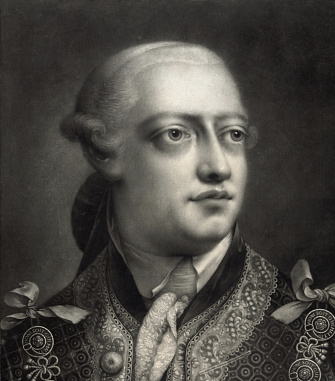King George III was the king of England when the American colonies broke away, establishing themselves as a sovereign nation (c. 1775-1783). His life is a study in extremes.

Sensual Ancestors George was the grandson of sensual, self-indulgent King George I and son of the equally sensual and self-oriented King George II. Both men were strong monarchs, pressing their will down on their nation and the British empire.
Weak Both his father and grandfather despaired of George ever being strong enough to be king. It did not look like he would ever become a man. Not healthy, an introvert, preferring books to riding horses; avoiding people to schmuzzing with them. Insecure. Dependent on a counsel of John Sewart Bute, under whose sway he had fallen . . . even into adulthood.
Family Man George Married a German woman he had met only hours before. Three hours after she arrived in England, she was married. She spoke no English, but he spoke German. Though the marriage was arranged, it turned out well. Queen Charlotte and George III had a healthy, happy marriage, rejecting the immorality of his father and grandfather and the mistresess expected mentality of the rich and powerful of the day.
The king and queen sought to create a counter-culture, wonderfully wholesome environment for their many children. Charlotte was to be pregnant much of their 21 years together. Indeed, 18 pregnancies is enough to exhaust any woman’s body. The king would romp and play with his children on the floor, determined to create a wholesome environment for his many children. Family man all the way.
Uncomfortable Ambiance His attitude about the obligations of royalty was also counter-culture. George was diligent in his duties as the administrative head of the nation. He placed a great emphasis on duty.
But when his many sons were 14 to 17 years of age, he shipped them off to boarding schools, supposedly to teach them to be men.
He was so focused on humility and duty that he could not praise any of his children for any good or diligence or accomplishment of any kind. So determined was he that they should be humble, he went overboard the opposite direction. His sons and daughter grew up emotionally deprived. Starved for affection and affirmation. Desperate for approval. George became the kind of parent under whom George would have shriveled as a boy. Somewhat scarred as a child, he arose to scar the next generation. Cold and unapproving. George damaged his family.
Worse, he was so selfish that he refused to allow his daughters to marry, even long after they reached marriageable age. He liked their company. He wanted them around, so he frustrated their normal, God-given desire of marriage. Fanny, for example, was forbidden to go out without permission, none were to visit her without an appointment and certainly no men were allowed. An attitude of “hysterical distress”1 weighed heavily on the already wilting spirits of the princesses. Selfish man.
Christian I became interested in George because he was reported to be a believer in the Lord Jesus Christ. His home life certainly showed spiritual diligence, and he was known to spend hours in prayer. How would a powerful king conduct himself during an era of expansion of the British Empire? How would he respond to colonies that were pressing for their own independence?
England liked wealth from the empire flowing into the home island. But expansion meant conquest and violence and exploitation. How could a Christian king condone that?
Part of the answer was that the times – empire, conquest, British expansion – were like a flowing river that swept him for it. Second, there were the frequent wars with France which had to be financed somehow. And the defense of the 13 American colonies required a lot of money – lest the French or Spain muscle in on England’s turf. Much of the budget came from the colonies, India and the Caribbean.
The Revolutionary War brought atrocities (likely on both sides). It was not a “splendid little war.” How could a Christian king do what King George III did. Jefferson’s Declaration of Independence had numerous pointed, personal insults and derogatory statements about the King of England. George reacted as any sinner would.
Insane From about 1793 on, George lost his grip on reality and went totally insane for some years before he died on January 29, 1820. Sad.
Conclusion Insecure as a child, then a period of being a very strong family man . . . which turned sour and then insanity. What will the Living God say about this life? What will eternity reveal to us about this public figure? What will happen to me? To you?
- A Royal Experiment by Janice Hadlow, page 443. This is as heavy a tome as I have ever read. Six hundred, eighty-five pages of intense detail. Good weapon to throw at a burglar. The author is light on the part I was most interested in – George’s spiritual life.

Recent Comments